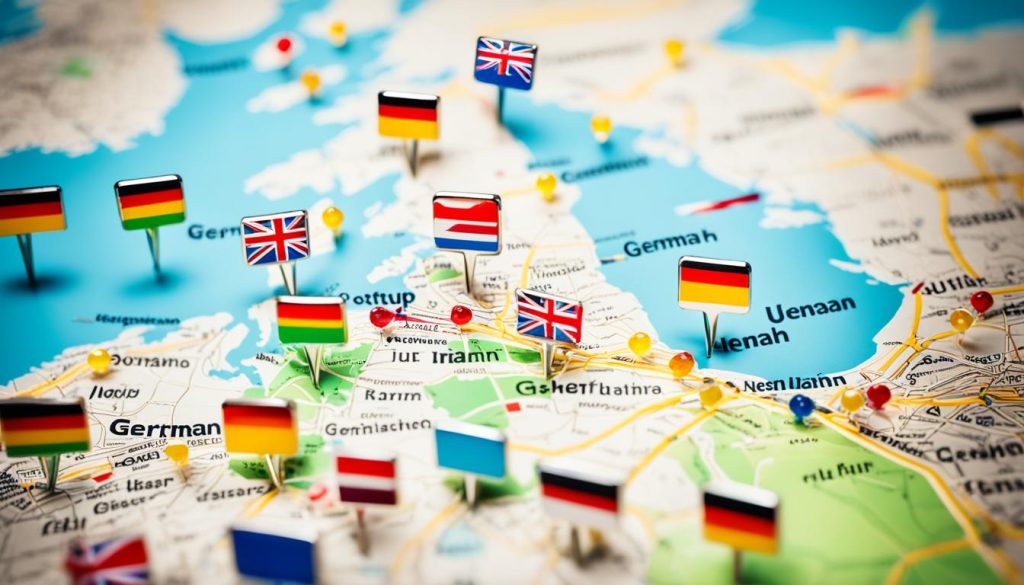Welcome to our in-depth look at German e-commerce startups in the UK. Their rise in popularity has made online shopping more intriguing. They bring new solutions and ideas to the e-shopping world.
Germany is known for its tech skill and business innovators. It has launched promising e-commerce startups in the UK. These startups focus on modern tech and eco-friendly efforts. They’re changing how we shop and how businesses work.
We’re diving into the growth of German e-commerce startups in the UK. Let’s explore their strengths and meet the entrepreneurs behind the trend. You’ll see how they are using innovation, caring for the environment, andworking with UK businesses.
It’s important to mention that these startups face challenges too. They deal with rules, competition, and the need to stand out. We’ll look into these issues and talk about how to overcome them.
We will look at case studies of German e-commerce successes in the UK. These stories will show us their paths and share their wisdom. To conclude, we’ll peek into what the future holds for these startups in the UK.
Join us on this exciting journey. Here, innovation, tech, and entrepreneurial spirit merge to define digital shopping’s future.
Key Takeaways:
- German e-commerce startups are making a big impact in the UK with new solutions and ideas.
- They use the latest tech and are mindful of the environment, transforming shopping and business activities.
- Working together, German and UK startups are pushing the industry forward with innovation.
- Despite facing hurdles like regulations and competition, they find ways to thrive in the UK market.
- Learning from successful German e-commerce stories can inspire and guide new entrepreneurs.
The Rise of German E-commerce Startups
In recent years, German e-commerce startups have gained significant traction in the UK. This growth is due to various factors and trends that have made the market ripe for their success.
Market Trends
The UK e-commerce scene is booming, with more people choosing to shop online. This shift offers a golden opportunity for German startups to thrive and grab market share.
Unique Value Propositions
German startups offer something special that sets them apart. They focus on niche areas, providing specific products and services. Their commitment to quality and innovation wins over customers, building a base of loyal fans.
Competitive Pricing
They’re also known for good deals, making high-quality items more affordable. By using savvy supply chains and buying in bulk, they keep prices low. This attracts those looking to save money without compromising on quality.
Collaborations and Partnerships
Working together with UK startups has been key to their success. These partnerships help them leverage strengths and broaden their market reach. It’s a win-win that fosters growth and innovation.
| Benefits of German E-commerce Startups | Market Trends |
|---|---|
| Specialized products and services | Growing demand for online shopping |
| High-quality and innovative offerings | Increasing consumer preference for convenience |
| Competitive pricing | Expanding e-commerce market in the UK |
| Collaborations and partnerships | Knowledge sharing between startups |
The rise of German e-commerce startups in the UK is creating thrilling possibilities. They’re transforming the e-commerce game with innovation and a focus on customers. Watching them grow and shape the UK’s e-commerce future will indeed be captivating.
Advantages of German E-commerce Startups
German e-commerce startups are making a big splash in the UK. Their unique edge and innovative ideas stand out. They offer great value and unforgettable shopping experiences. Let’s look at why they’re doing so well:
1. Technological Expertise
These startups are tech wizards. They use the latest in technology to make shopping online smooth and easy. They’re always updating their platforms. This means better shopping for everyone.
2. Customer-Centric Approach
What sets German startups apart is how much they care about their customers. They work hard to give shoppers what they want. Using data, they tailor the shopping experience to each person. This wins hearts and builds loyalty.
3. Effective Utilization of Data Analytics
They’re pros at using data analytics. By understanding what shoppers like, they can market more effectively. They offer what customers are looking for. This keeps shoppers coming back for more.
4. Emphasis on Quality and Sustainability
Quality and the environment are big for these startups. They aim to sell top-notch products. And they’re serious about being green. This draws in those who care about the planet.
German e-commerce startups offer a lot to the UK market. With their tech savvy, focus on customers, smart use of data, and dedication to quality and the environment, they’re changing the game. They’re setting the bar high for others to follow.
| Advantages | Description |
|---|---|
| Technological Expertise | German e-commerce startups leverage advanced technologies to enhance user experiences and provide personalized recommendations. |
| Customer-Centric Approach | These startups prioritize customer needs and preferences, offering tailored solutions and personalized experiences. |
| Effective Utilization of Data Analytics | German e-commerce startups collect and analyze customer data to make targeted marketing decisions and optimize their strategies. |
| Emphasis on Quality and Sustainability | These startups focus on offering high-quality products and adopt eco-friendly practices to promote sustainability. |
Key German E-commerce Startups in the UK

German e-commerce startups are shaking up the UK market. They are changing traditional shopping and getting noticed by buyers. Here, we’ll look at some main startups changing the online buying world:
1. Zalando
Zalando started in Berlin in 2008 and changed online fashion shopping. It offers lots of clothes, shoes, and accessories. Zalando focuses on easy shopping and top-notch customer service, making it a favorite for UK fashion fans.
2. HelloFresh
As a global leader in meal kits, HelloFresh stands out in the UK. This startup offers helpful and tailored meal plans. It suits busy people with quality ingredients and simple recipes, winning over customers who want an easy cooking option.
3. Home24
Home24 brings German furniture and decor online for UK shoppers. It has everything for each room, making it easy to find stylish and useful home items. Home24’s focus on being eco-friendly also appeals to those who care about the planet.
4. FlixBus
FlixBus is transforming bus travel with its cheap and green buses. It started in Germany and moved to the UK, offering a better way to travel. FlixBus is loved for its focus on happy travellers and protecting the environment, attracting those who want to save money and the planet.
These examples show how German e-commerce startups are making a big impact in the UK. They offer unique products, care about their customers, and think about the earth. They are leading in the online market because of this.
| German E-commerce Startup | Industry | Unique Offering |
|---|---|---|
| Zalando | Fashion | Extensive selection and seamless shopping experience |
| HelloFresh | Meal Kit Delivery | Convenient and customizable meal solutions |
| Home24 | Furniture and Decor | Stylish and functional home furnishings with a focus on sustainability |
| FlixBus | Transportation | Affordable and eco-friendly intercity bus services |
These companies show the variety of new solutions German startups bring to the UK. As they grow and meet changing needs, we’ll see more exciting changes in UK e-commerce.
Innovative Solutions Driving German E-commerce Startups
German e-commerce startups are making a big impact with new ideas and technology. They know how fast customer needs change. So, they’re using the latest technology for a better shopping experience.
Artificial Intelligence
Artificial intelligence (AI) is a key tool for them. With AI, these startups look at lots of customer data to see trends and likes. This helps them make personal suggestions, manage stock better, and target ads. Customers are happier, and sales go up.
Augmented Reality
Augmented reality (AR) is another tool they use to improve online shopping. Customers can see how products would look at home before buying. This fun feature makes customers trust the company more, cuts down on returns, and boosts sales.
Blockchain Technology
Blockchain technology is also used by these startups. It makes the supply chain clearer and more secure. By using blockchain, they can prove their products are real and make buying and selling safer. Customers trust these e-commerce sites more because everything is open and honest.
By bringing in these new tools, German e-commerce startups are changing the game. They’re focused on using the latest tech to stay ahead. This not only helps them stand out but also improves shopping for everyone.
German E-commerce Startups and Sustainability
German e-commerce startups are leading the way in sustainable business. They aim to positively impact the environment. They do this by embracing eco-friendly practices across their operations.
Reducing Carbon Footprint
Reducing their carbon footprint is a top priority for these startups. They use energy-saving tech and green logistics to cut down emissions. By planning better routes, using electric vehicles, and investing in green energy, they aim to be eco-friendly. This helps them serve UK customers responsibly.
Promoting Fair Trade
Understanding fair trade’s value is key for these startups. They work closely with fair trade groups and choose to work with ethical suppliers. This ensures workers get fair pay. It also means UK buyers get products that are responsibly sourced.
Ethical Sourcing
Ethical sourcing is another important focus. Startups choose suppliers who are kind to our planet. These suppliers use organic materials, limit waste, and avoid nasty chemicals. This approach makes the supply chain more sustainable and offers green choices to UK customers.
| German E-commerce Startups | Sustainability Initiatives |
|---|---|
| Company A | Investment in renewable energy sources for operations |
| Company B | Collaboration with fair trade organizations for responsible sourcing |
| Company C | Implementation of eco-packaging and waste reduction strategies |
German e-commerce startups are building a greener future in the UK market. They focus on lowering emissions, supporting fair trade, and ethical sourcing. Their dedication to sustainability meets consumer expectations. It also makes the e-commerce scene greener and more eco-aware.
Collaborations between German and UK E-commerce Startups

Today, working together is essential for success and growth in the business world. German and UK e-commerce startups are teaming up. They aim to enter new markets, make the most of each other’s strengths, and offer something special.
By partnering, these startups gain various perspectives, skills, and contacts. This helps them enter markets more easily and become more successful.
Driving Mutual Growth
When German and UK startups work together, both can grow and reach further. They share customer bases, tapping into new areas and people. Exchanging ideas boosts creativity and helps tailor products to fit different needs.
Also, they share resources and know-how, which strengthens them all. A German startup’s tech skills combined with a UK startup’s marketing savvy is powerful. This makes them more competitive and paves the way for lasting growth.
Expanding Market Reach
Team-ups between German and UK startups widen their market and attract more customers. By joining forces, they handle rules and policies better thanks to shared knowledge. This makes entering new markets quicker by ensuring products meet local needs.
These partnerships allow for exploring new markets and ways to sell. For example, a German startup into green fashion might team up with a UK one focused on ethical shopping. Together, they can introduce eco-conscious products to more people.
Building a Supportive Network
These partnerships are about more than just business growth. They create a support system within the e-commerce world. Startups share experiences and advice, fostering a community where ideas and solutions are freely exchanged.
Also, these collaborations open doors to guidance from e-commerce veterans. They offer insights into the industry, helping avoid mistakes and smooth out challenges.
Together, German and UK startups boost one another’s success, secure their market presence, and inspire innovation in e-commerce.
Challenges Faced by German E-commerce Startups in the UK
German e-commerce startups face unique hurdles when expanding into the UK market. Despite their success in Germany, entering a new market with different cultures, laws, and competition is tough. They need to adapt and navigate carefully.
Cultural Differences
Understanding the UK’s cultural nuances poses a major challenge for German startups. The shopping habits and preferences of consumers differ greatly. It’s vital to research the market well and adjust offerings to match UK consumers’ needs. They also need to build brand trust, which calls for local knowledge.
Legal Complexities
The UK’s legal framework can be complex for German startups. It’s critical to comply with UK laws, like data protection and consumer rights, to build trust. Startups must meet all legal requirements and secure the right licenses. Partnering with UK legal experts can simplify navigating these complexities.
Competition
The competition in the UK e-commerce space is fierce, with many established and new startups. German startups must differentiate themselves. They need to offer great customer service and use innovative tech. Partnering with locals or acquiring UK e-commerce startups can help them stand out.
A Comparison of Challenges Faced by German E-commerce Startups in the UK
| Challenges | Description |
|---|---|
| Cultural Differences | Understanding and adapting to UK consumer behavior, preferences, and shopping habits |
| Legal Complexities | Navigating the complex UK legal landscape and ensuring compliance with regulations |
| Competition | Competing with established players and local startups in the UK e-commerce market |
To overcome these hurdles, German startups must be proactive and strategic. They should focus on market research, localization, and forming strong partnerships. By tackling these challenges directly, they can tap into the UK’s potential for growth.
Strategies for Success for German E-commerce Startups in the UK
For German e-commerce startups, the UK market offers big opportunities. Success there needs good planning and strong strategies. We’ll look at the best strategies these startups can use to do well in the UK.
1. Localization
Adapting to the UK market is a must. Startups need to translate their websites and product details into British English. It’s also key to grasp cultural differences and adjust marketing to fit. This helps improve how locals see your brand and increases customer interest.
2. Understanding the Target Audience
Knowing your UK audience inside out is crucial. Market research helps find out what customers like and dislike. Startups can then adjust their products and messages to meet these needs. This makes it easier to connect with the right people.
3. Building a Strong Brand Presence
Having a strong brand in the UK market matters a lot. Startups need to show what makes them special. They should also build an attractive brand look and talk to customers online. Teaming up with local influencers can also make your brand more popular and trusted.
4. Providing Excellent Customer Experience
Great customer service keeps customers coming back. Startups should ensure quick deliveries and easy returns. Being personal and keeping in touch with customers also builds solid relationships. This good service will get people talking positively about your brand.
5. Embracing Innovative Technologies
Using new technology can put German startups ahead in the UK. This includes using AI for better customer suggestions and chatbots for quick help. Creating a great mobile shopping experience is also essential. These tech advances can really make a difference.
Using these strategies wisely can boost German startups’ success in the UK. It’s important to keep updating these strategies based on new trends, customer feedback, and changes in what people want. This way, startups can stay ahead.
Regulatory Compliance for German E-commerce Startups in the UK

For German e-commerce startups aiming for success in the UK, following the rules is key. By sticking to the rules, they can gain consumer trust and dodge legal risks. We will look at the main points startups should consider to be compliant in the UK.
Data Protection
Good data protection is vital for German e-commerce startups in the UK. They must understand and follow the GDPR, which covers personal data in the EU and UK. Using strong security, getting clear consent for data use, and giving straightforward privacy notices are major steps for sticking to data rules.
Consumer Rights
German e-commerce startups need to know about UK consumer rights laws. They should understand rules about consumer contracts, product safety, and rights around faulty items. Providing true product information, fair terms, and effective customer support is key to avoid legal issues and build a strong reputation.
Tax Obligations
Meeting tax requirements is critical for German e-commerce startups in the UK. They have to know about VAT rules, including registering, collecting, and reporting it. Working with tax experts or official advice can help make sure they meet these complex tax rules.
By focusing on meeting the rules, German e-commerce startups can do well in the UK’s legal environment. Ignoring these rules can harm their reputation, lead to fines, or even court cases, harming their growth and success.
We will next look into what the future holds for German e-commerce startups in the UK, looking at upcoming chances and hurdles.
Future Outlook for German E-commerce Startups in the UK
German e-commerce startups are growing in the UK market, offering many promising opportunities. The digital shift and a higher desire for online shopping fuel their growth. They are set to grow and find success.
These startups succeed by meeting changing consumer needs. They offer smooth online experiences, personalise services, and have quick delivery options. This focus on customer happiness gives them an advantage over others in the e-commerce field.
Technology is vital for these startups’ future in the UK. They use new tech like artificial intelligence and big data to improve. This helps them run better, save time, and connect with customers. Staying ahead in tech means they can beat the competition and grow.
Trends like demand for green products also offer chances for growth. These startups can win more customers by selling eco-friendly goods and being more sustainable. This approach can help them succeed in the long term.
| Key Factors for Future Success of German E-commerce Startups in the UK |
|---|
| Adaptation to evolving consumer expectations |
| Utilization of cutting-edge technologies |
| Capitalation on emerging trends |
Working together with UK startups could also help German e-commerce businesses. By sharing skills and knowledge, they can create new solutions, reach more people, and grow together. It’s a win-win for everyone.
The outlook for German e-commerce startups in the UK is bright. By focusing on what customers want, using the latest tech, caring for the environment, and collaborating, these startups are ready to succeed in a changing e-commerce world.
Case Studies of Successful German E-commerce Startups in the UK
In this section, we’re diving into how German e-commerce startups succeeded in the UK. We’ll look at their strategies, obstacles, and key lessons. Join us to uncover the secrets behind their success.
Zalando
Launched in 2008 in Germany, Zalando became a fashion powerhouse. It broke into the UK market in 2011. Today, it’s a go-to for online fashion shopping.
Here’s how Zalando made it big in the UK:
- They offer lots of fashion products for different tastes.
- Their online shopping experience is easy and smooth.
- They run strong digital marketing to grow their brand and connect with customers.
Zalando prioritises customer happiness and keeps innovating. This approach has made them strong in the UK fashion world.
HelloFresh
HelloFresh, famous for its meal kits, has also made its mark in the UK. It’s known for easy, healthy meals. Their success comes down to:
- Partnering with local suppliers for the freshest ingredients.
- Flexible meal plans to suit everyone’s needs.
- Reliable delivery, making sure meals arrive on time.
With a focus on being eco-friendly and pleasing customers, HelloFresh stands out in the UK market.
Home24
Home24 has made waves in the UK’s furniture and home decor scene. It offers a wide selection and top-notch service. Here’s what they do:
- They sell high-quality furniture and decor at good prices.
- Customers get personalised support when they shop.
- They use cool tech like augmented reality to improve shopping.
Home24 thrives by offering value and convenience, making it a favourite for UK shoppers wanting great home goods.
| Company | Year Founded | Main Product/Service | Key Strategies |
|---|---|---|---|
| Zalando | 2008 | Fashion and lifestyle platform | Wide product range, user-friendly experience, effective digital marketing |
| HelloFresh | 2011 | Meal kit delivery service | Partnerships with food suppliers, flexible subscriptions, efficient logistics |
| Home24 | 2009 | Online furniture and home decor retailer | Wide product selection, personalized customer support, advanced technology |
These German e-commerce successes in the UK are perfect lessons for budding and grounded businesses aiming to go global. By adopting effective strategies, they’ve not just grown but have become leaders in the UK e-commerce space.
Conclusion
German e-commerce startups are making a big splash in the UK market. They offer new solutions, tech innovations, and a keen interest in being sustainable. This matches well with what UK shoppers want these days.
Even though these startups face challenges like strict rules and tough rivals, they find ways to succeed. Their partnership with UK businesses has been key to their growth.
The outlook for German e-commerce startups in the UK looks bright. Their ongoing expansion is set to leave a lasting mark on the e-commerce scene.
German e-commerce startups have introduced exciting changes and competition to the UK. By working together, Germany and the UK are set to benefit greatly from this partnership.
















